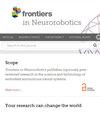基于本体的自主机器人任务处理框架
IF 2.6
4区 计算机科学
Q3 COMPUTER SCIENCE, ARTIFICIAL INTELLIGENCE
引用次数: 0
摘要
引言 近年来,机器人的感知能力得到了显著提升。本文提出了一种基于本体的机器人自主任务处理框架(ARTProF),以提高机器人在非结构化动态环境中的适应能力。ARTProF 将本体知识表示、推理、自主任务规划和执行统一到一个框架中。ARTProF 首次引入了知识库与基于神经网络的物体检测之间的接口,以提高机器人的感知能力。然后,设计了基于机器人操作系统(ROS)的知识驱动操纵操作器,以促进知识库与机器人基本操作之间的互动。此外,还提出了一种操作相似性模型,以赋予机器人对新物体进行泛化的能力。最后,一种利用本体知识的动态任务规划算法使机器人具备了在非结构化动态环境中执行任务的适应能力。讨论在未来的工作中,我们将重点通过整合神经符号推理来完善 ARTProF 框架。本文章由计算机程序翻译,如有差异,请以英文原文为准。
Ontology based autonomous robot task processing framework
IntroductionIn recent years, the perceptual capabilities of robots have been significantly enhanced. However, the task execution of the robots still lacks adaptive capabilities in unstructured and dynamic environments.MethodsIn this paper, we propose an ontology based autonomous robot task processing framework (ARTProF), to improve the robot's adaptability within unstructured and dynamic environments. ARTProF unifies ontological knowledge representation, reasoning, and autonomous task planning and execution into a single framework. The interface between the knowledge base and neural network-based object detection is first introduced in ARTProF to improve the robot's perception capabilities. A knowledge-driven manipulation operator based on Robot Operating System (ROS) is then designed to facilitate the interaction between the knowledge base and the robot's primitive actions. Additionally, an operation similarity model is proposed to endow the robot with the ability to generalize to novel objects. Finally, a dynamic task planning algorithm, leveraging ontological knowledge, equips the robot with adaptability to execute tasks in unstructured and dynamic environments.ResultsExperimental results on real-world scenarios and simulations demonstrate the effectiveness and efficiency of the proposed ARTProF framework.DiscussionIn future work, we will focus on refining the ARTProF framework by integrating neurosymbolic inference.
求助全文
通过发布文献求助,成功后即可免费获取论文全文。
去求助
来源期刊

Frontiers in Neurorobotics
COMPUTER SCIENCE, ARTIFICIAL INTELLIGENCER-ROBOTICS
CiteScore
5.20
自引率
6.50%
发文量
250
审稿时长
14 weeks
期刊介绍:
Frontiers in Neurorobotics publishes rigorously peer-reviewed research in the science and technology of embodied autonomous neural systems. Specialty Chief Editors Alois C. Knoll and Florian Röhrbein at the Technische Universität München are supported by an outstanding Editorial Board of international experts. This multidisciplinary open-access journal is at the forefront of disseminating and communicating scientific knowledge and impactful discoveries to researchers, academics and the public worldwide.
Neural systems include brain-inspired algorithms (e.g. connectionist networks), computational models of biological neural networks (e.g. artificial spiking neural nets, large-scale simulations of neural microcircuits) and actual biological systems (e.g. in vivo and in vitro neural nets). The focus of the journal is the embodiment of such neural systems in artificial software and hardware devices, machines, robots or any other form of physical actuation. This also includes prosthetic devices, brain machine interfaces, wearable systems, micro-machines, furniture, home appliances, as well as systems for managing micro and macro infrastructures. Frontiers in Neurorobotics also aims to publish radically new tools and methods to study plasticity and development of autonomous self-learning systems that are capable of acquiring knowledge in an open-ended manner. Models complemented with experimental studies revealing self-organizing principles of embodied neural systems are welcome. Our journal also publishes on the micro and macro engineering and mechatronics of robotic devices driven by neural systems, as well as studies on the impact that such systems will have on our daily life.
 求助内容:
求助内容: 应助结果提醒方式:
应助结果提醒方式:


